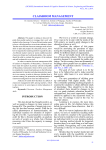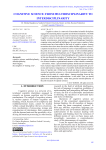International Journal of Cognitive Research in Science, Engineering and Education @ijcrsee
Статьи журнала - International Journal of Cognitive Research in Science, Engineering and Education
Все статьи: 494
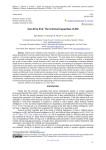
Can AI be Evil: The Criminal Capacities of ANI
Статья научная
Artificial Narrow Intelligence (ANI) represents a captivating domain within technological advancement, bearing the potential for profound societal transformations. While ANI holds the promise of enhancing various facets of human existence, it concurrently engenders inquiries into its “darker aspects.” This study delves into the challenges associated with ANI’s conceivable manifestation of harm and injustice, a phenomenon devoid of consciousness, intention, or responsibility akin to that of human entities. A pivotal dimension of ANI’s “dark side” pertains to its susceptibility to malevolent utilization. Despite its lack of awareness, ANI serves as a tool for malicious endeavors, encompassing the propagation of disinformation, compromise of security systems, and consequential decision-making. This prompts contemplation on strategies to mitigate these “precise manifestations of malevolence” arising from ANI’s technological progression. Additionally, ANI’s development introduces profound ethical quandaries. Ensuring ANI’s alignment with moral principles while averting scenarios in which it generates decisions conflicting with human morality becomes a pressing concern. This research underscores the imperative for rigorous regulatory frameworks and ethical directives to curtail potential hazards and unscrupulous utilization of ANI. The fundamental objective of this investigation is to advocate for the responsible deployment of ANI in society. A comprehensive understanding of potential risks, complemented by meticulous consideration of ethical dimensions, emerges as an indispensable prerequisite to harmonizing technological advancement with safeguarding societal and individual interests.
Бесплатно
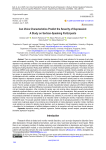
Статья научная
There is a growing interest in detecting depression through vocal indicators for the purpose of early diagnosis and therapeutic monitoring. Thus, research on voice characteristics in different language areas among individuals with depression may potentially contribute to the standardization of vocal analysis and the development of automatic recognition programs. This study aims to determine whether specific voice characteristics can predict the severity of depression using the Montgomery-Asberg Depression Rating Scale (MADRS) in a sample of Serbian-speaking participants. The analysis included perceptual (GRBAS scale parameters) and acoustic (parameters of frequency variability, intensity variability, and noise and tremor estimation using the MDVP software) voice characteristics in a sample of 100 participants. The sample was divided into two groups: an experimental group of participants diagnosed with depressive disorder (N = 45), including an equal number of participants with mild, moderate, and severe depression (N = 15), and a control group of participants without a depressive disorder diagnosis or depression symptoms (N = 55). The prediction of depression severity based on voice characteristics was conducted using hierarchical regression analysis. The results indicate statistically significant differences in nearly all acoustic and all perceptual voice characteristics among participants with different levels of depression symptoms (MADRS score). Post-hoc analysis revealed no differences in acoustic characteristics between subgroups with different depression severity levels. However, significant differences in perceptual characteristics were found among all subgroups, except between mild and moderate depression. After controlling for gender, age, and smoking status, depression severity demonstrated statistically significant effects on nearly all acoustic and all perceptual voice characteristics. Both perceptual and acoustic voice characteristics can predict the severity of depression. The acoustic parameter of peak amplitude variation (vAm) and the perceptual parameters of hoarseness (G), breathiness (B), asthenia (A), and strain (S) were significant predictors of depression severity. Voice may hold potential as an indicative marker in predicting the severity of depression measured by the MADRS scale. The acoustic parameter related to intensity variation and the perceptual parameters of the GRBAS scale (except voice roughness) appear to be promising voice characteristics in training depression recognition models. Identifying vocal indicators as markers for detecting mental disorders, such as depression, through regression analysis may serve as a foundation for the development of artificial intelligence models for its recognition and may have future clinical relevance.
Бесплатно
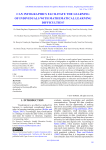
Can infographics facilitate the learning of individuals with mathematical learning difficulties?
Статья обзорная
Visualization of data has recently gained great importance in education and use of infographics is regarded as an important tool in teaching mathematics since it presents information in a clear and abstract way. Therefore, use of infographics for helping individuals with mathematical learning difficulties has become an important research question. This study aims to provide an overview on the use of infographics in teaching mathematics to individuals with mathematical learning difficulties. This is a qualitative study in which document analysis was used the collect the data. Results provided information about the definition of infographics, effectiveness of using infographics in education and facilitative role of infographics in enhancing learning of individuals with mathematical learning difficulties, namely dyscalculia. Results were discussed with relevant literature and recommendations for further research and practices were also presented.
Бесплатно
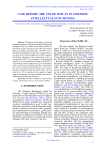
Case report: the use of WISC-IV in assessing intellectual functioning
Отчет
The purpose of this paper is to provide detailed description of clinical assessment of the Wechsler Intelligence Scale for Children-Fourth Edition (WISC-IV) that can be used by clinicians to assess the level of intelligence of children and adolescents. The WISC-IV is a standardized intelligence test provides essential information and critical clinical insights into a child’s cognitive functioning. Literature review and analysis of how to interpret the WISC-IV are described. A psychological report of a 15 year African girl with the use of WISC-IV is reported and clinical impression is given. Information from several sources including interviews with parents, test scores and behavioral observations were used to develop a hypothesis about the child’s skills. Her Full Scale IQ of 125 is classified in the superior or higher range of intelligence. Recommendations about how to address problem areas are discussed.
Бесплатно
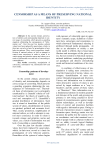
Censorship as a means of preserving national identity
Статья научная
In the current climate, preservation of identity and statesmanship depends on correct usage of censorship, which presents a guarding organism eliminating the consequences of “information war”. Over the past few decades cultural values have been replaced by quasivalues, which, in their turn, served as a basis for promulgation of new behavior patterns. Thus, society promotion, simplification of national culture, as well as attempts to control mass conscience in order to orient it towards strange and primitive norms and values, are a result of information war and lack of censorship as counterbalance.
Бесплатно
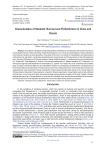
Characteristics of students’ burnout and perfectionism in China and Russia
Статья научная
The problems of studying the relationship between manifestations of perfectionism and emotional burnout are of considerable interest to modern psychology. Prospective participants in such a study are representatives of various professional communities and students as future specialists. The purpose of this work is to consider the manifestations and relationships of emotional burnout, self-esteem, mental states and perfectionism among Russian and Chinese students. A total of 80 people took part in the study (40 Russian and 40 Chinese students). Research Methods applied: 1) multidimensional scale of perfectionism by P. Hewitt and G. Flett, adapted by I.I. Grachev; 2) the burnout questionnaire by K. Maslach adapted by N.E. Vodopyanov; 3) a technique for diagnosing self-assessment of mental states by G. Eysenck. As a result of the use of comparative and correlation types of analysis, intercultural differences and interrelations between the characteristics of perfectionism, self-assessment of the emotional state and characteristics of emotional burnout were found. Respondents from China showed lower results on the “aggressiveness” scale compared to Russian respondents. Russian students showed higher scores on the “anxiety” scale than Chinese students. Meanwhile, Chinese students, compared to Russian respondents, showed higher results in self-confidence and their future. In the course of the study, both groups showed average indicators of rigidity, but the level of rigidity in Russian students was higher than in Chinese students. In conclusion of this scientific study, the main recommendations for the correction of emotional burnout and self-regulation of perfectionism and mental states among students are proposed.
Бесплатно
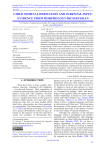
Child nominal derivation and parental input: evidence from morphology-rich Russian
Статья научная
The purpose of current article is to describe the early phases of first language acquisition of nominal derivatives in morphology-rich Russian approaching an ideal inflecting-fusional language type. The results are based on the naturalistic longitudinal observations of two typically developing monolingual children (1;5-3;0) growing up in middle socio-economic status families (33 hours of recorded spontaneous speech). It has been revealed that derivation morphology, viz. affixation, starts to develop early and precedes compounding. Within nouns, suffixation is the main method of word-formation. Prefixation and mixed methods are rare. Although nouns can be formed from almost any grammatical classes, they are mainly formed from nouns in child speech. Early compounds can be described as right-headed endocentric ones where their main component is a noun or a verb. The preference for certain patterns and models rarely differs in child speech corpora. Both children have similar development of semantic categories and only a few innovations. The morpheme and semantic (cognitive) complexity of nominal derivatives in child speech increase by the end of the observation period. The influence of parental input is significant for the mechanisms of derivation morphology acquisition. This is confirmed by the presence of a positive correlation for both lemmas and tokens of nominal derivatives. The most frequent patterns in parental input are acquired by a child earlier.
Бесплатно
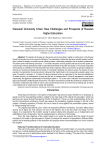
Classical university crisis: new challenges and prospects of Russian higher education
Статья обзорная
The objective of the paper is to discuss the most crucial problem, related to “winding down” of the Russian Liberal Arts education due to its economic inefficiency. The methodology includes the descriptive scientific-research method, which involves the analysis of scientific sources, official provisions, mass-media publications and the students' questionnaire. The authors came to the following conclusions: 1. The model of education, which is guided by the logic of economic growth, and not by the logic of human development, leads to a general dehumanization of education and society. 2. The process of education “dehumanizing” is manifested in the following destructive trends: pragmatic utility and convenience of gaining knowledge; the dominance of technical knowledge and the transfer of humanitarian disciplines into optional courses; the advance of online education; the imperfection of university lecturers' ratings and their transformation into a bureaucratic evaluation system; new types of inequality in education. 3. In Russia, the above-mentioned trends are aggravated by the abnormal establishment of market economy; the verticalization of power and the lack of professionalism in university management; social sphere underfunding; the aggressive implementation of the Bologna system. 4. The current crisis in education is accompanied by the large-scale emigration of gifted students and lecturers. The authors recommend to consider the University as a classical “home” of formation, preservation and transfer of culture; online courses should be seen as a new format of teaching aids, as well as a technological tool for retraining and for people with disabilities.
Бесплатно
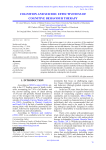
Cognition and suicide: effectiveness of cognitive behaviour therapy
Статья обзорная
The aim of this review paper is to show an overview of the empirical evidence of effectiveness of cognitive behavioral therapy (CBT) in reducing suicidal cognitions and suicidal behavior. The topic of suicidal cognition and suicidal behavior is of special importance to clinicians and practitioners. Analyses of empirical findings from the oldest, first systematic review and meta-analysis and the newest one shown that there not enough evidence from clinical trials to suggest that CBT focusing on mental illness reduces suicidal cognitions and behaviors. But, from the other hand, CBT focusing on suicidal cognitions and suicidal behaviors was found to be effective. Taking into consideration the effectiveness of this psychotherapy, we can conclude that it is preferable for clinicians to be trained in working with CBT techniques focused on suicidal cognition and behavior that are independent of treatment of mental disorders. In addition, it is necessary to initiate new research that will make it possible to create preventive and interventional programs dedicated to reducing the risk of suicide.
Бесплатно
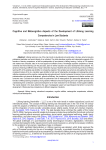
Статья научная
Lifelong learning is one of the main trends in educational and social policy in Europe, aimed at ensuring professional realization and social integrity of an individual. The article describes cognitive and metacognitive aspects of the formation of learning competence, as well as predisposition of law students to lifelong learning. A survey of 218 students and masters was conducted, data on the most popular and effective forms of knowledge acquisition (experience of formal, nonformal and informal learning over the past year), plans for further education and career development were collected. The dynamics of learning at different years of study is described. A group of students with pronounced learning and focus on lifelong learning (45% of the sample) was identified. A comparative analysis of two samples was carried out and qualities that could be considered markers of the LLL orientation were identified: a high level of metacognitive knowledge and metacognitive activity, reflective competence (at the cognitive, metacognitive and personal level), internal involvement in learning, focus on achieving professionalism and personal development, general self-efficacy, the prevalence of progressive and creative motives over consumer ones. Conclusions are drawn about the predominant role of metacognitions and personality determinants in the formation of lifelong learning competency among students. Reflection aimed at recognizing one's own cognitive processes and understanding their contribution to personal development is the main mechanism for the formation of meta-cognitive abilities. The results obtained in the study determine the ways of pedagogical support and psychological intervention to ensure the development of lifelong learning competencies in different categories of students.
Бесплатно
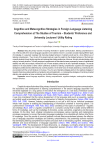
Статья научная
Being the primary channel of incoming information in spoken communication, listening comprehension is one of the key skills of the second language acquisition to be mastered. Since it is a complex concept implying different types of knowledge, it is assumed nowadays that improving strategic behaviour of students would lead to a more efficient use of listening comprehension. Thus, the aim of the present study is to gain the insight into the strategic behaviour of the freshmen university students through testing cognitive and metacognitive strategy preferences. Moreover, the study included strategy utility rating by university lecturers. The study employed a questionnaire to draw data that were processed by means of mathematical statistics and utility value analysis, whereas the use of Pareto analysis pointed to the set of preferable strategies. The results obtained in the study testify to rather uniform preference ascribed to listening comprehension cognitive and metacognitive strategies by skilled and less skilled first-year university students. On the other hand, the results obtained by university lecturers are consistent with the current literature on the issue. Thus, the set of desirable strategies points to the cognitive strategies of linguistic inferencing, global prediction and academic and world elaboration, i.e. metacognitive strategies of monitoring, directed attention and evaluation as those contributing most to efficient listening comprehension.
Бесплатно
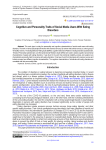
Cognitive and personality traits of social media users with eating disorders
Статья научная
This work aims to study the personality and cognitive characteristics of social media users with eating disorders. The work in-volved 209 people (84 women with anorexia nervosa, 82 women with bulimia nervosa, a control group of 43 healthy women). The Eating Behavior Rating Scale (EBRS), Cognitive-behavioral Patterns in Eating Disorders Questionnaire, 16-factor Personality Questionnaire, and the Dysfunctional Relations Scale (DRS) were used to assess cognitive and personal characteristics of people with eating disorders. It was found in the work that emotional instability, anxiety, and suspicion are characteristic personality traits for persons with eating disorders. It has been found that individuals with anorexia nervosa and bulimia nervosa have different cognitive characteristics. The cognitive characteristics of individuals with eating disorders are correlated with their per-sonality traits.
Бесплатно
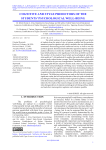
Cognitive and style predictors of the students' psychological well-being
Статья научная
The article analyses the psychological well-being and basic beliefs of students from the point of view of various variables, but the particular attention is payed to cognitive style, which is studied as the way of information assessment, determining person's intellectual activity as well as own life activity in general. Theoretical and multivariate regression (stepwise method) analyses allowed us to define the models of psychological well-being and basic beliefs predictors at the significance levels from p≤0.000 to p≤0.043. The number of the students' basic beliefs and psychological well-being style models is 17 of hypothetical 18 models; this result reflects a high (94.4 percent) study subject matter coverage. The following groups of the models were pointed out in a process of categorization: “harmonic” (these cognitive styles are highly efficient and prove that the style criteria correlate with the basic beliefs and psychological well-being ones); “tending to harmonize” (characterized by the cognitive styles inclusiveness dominating, leading to activity efficiency, but including individual style pole-correctors); “ambivalent” (cognitive style poles inclusiveness dominates, while other poles domination decreases). The following conclusions are made on the basis of statistically significant results: the level and peculiarities of the style poles and students' psychological well-being and basic beliefs regression equations correlation is the determinant, defining the success of these poles and beliefs directly or indirectly. The results of the research enlarge scientific facts about cognitive styles being predictors of students' psychological well-being and basic beliefs and make their metacognitive regulation and evaluation possible.
Бесплатно
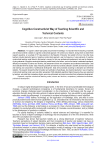
Cognitive constructivist way of teaching scientific and technical contents
Статья научная
For pupils to obtain high-quality and permanent knowledge, it is important that the teaching of scientific and technical contents is based on cognitive constructivist approach. We carried out a research, during which we asked three research questions, on a sample of 167 class teachers in the Republic of Slovenia. We wanted to find out: how often class teachers included elements typical of cognitive constructivist approach; was the frequency of using elements of cognitive constructivist teaching model linked to the teacher’s concern for their own professional development, and was the frequency of using elements of cognitive constructivist teaching model linked to the factors, such as the teacher’s estimated importance, difficulty and necessity of Science and Technics, the assessment of their own competence and professional enthusiasm. Data were collected with three scales: ways of teaching scientific and technical contents; attitude to scientific and technical contents and teaching and components of professional development. Data were processed according to descriptive and inferential statistics. The research showed that the formulation and verification of hypotheses, two important elements in view of cognitive constructivist teaching model, were less often represented. With statistically significant higher frequency they were organized by teachers, who rated their competence higher, were more enthusiastic and cared more about their professional development.
Бесплатно
Статья научная
This study introduces a system design in a form of cognitive dialog game (DiaCog) to support pedagogical factors and student learning model ideas. The purpose of the study is to describe how such a design achieves tracking and adapting students’ knowledge and mastery learning levels as a cognitive assistant. Also, this study shows alternative ways for supporting intelligent personal learning, tutoring systems, and MOOCS. This paper explains method called DiaCog that uses structure for students` thinking in an online dialog by tracking student`s level of learning/knowledge status. The methodology of computing is the semantic that match between students` interactions in a dialog. By this way it informs DiaCog’s learner model to inform the pedagogical model. Semantic fingerprint matching method of DiaCog allows making comparisons with expert knowledge to detect students` mastery levels in learning. The paper concludes with the DiaCog tool and methodologies that used for intelligent cognitive assistant design to implement pedagogical and learner model to track and adapt students’ learning. Finally, this paper discusses future improvements and planned experimental set up to advance the techniques introduced in DiaCog design.
Бесплатно
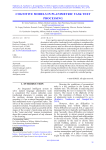
Cognitive models in planimetric task text processing
Статья научная
A new cognitive approach is proposed for understanding the texts of planimetric tasks and for visualizing the task conditions to complement the syntactic-semantical sentence parsing. Two main difficulties in understanding texts of plane geometry tasks are observed: the ellipticity and vagueness of texts. To overcome the difficulties in understanding the task conditions it is proposed constructing cognitive models of objects and relations between them. The proposed cognitive approach is incorporated in an integrated system for automatic solving planimetric tasks with the natural language interface. The interactive visualization has been developed in the system. It depicts the syntactic and semantic structures as a result of natural language text analysis and searching for task solution. This visualization allows the users to obtain explanations associated with any elements of the images and to correct the tasks' texts in dialog with the system. The destiny of the system is to serve for training schoolchildren in the domain of Euclidean geometry. The cognitive approach proposed can be a first step to automated analyzing plane geometry texts, in perspective, as a cognitively controlled parsing.
Бесплатно
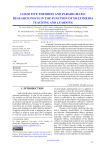
Статья обзорная
At present it is almost impossible to imagine formal and non-formal education without the use of computers and information and communication technology (ICT), and we can rightly say that modern education is increasingly taking place in a multimedia environment and relying on multimedia teaching and learning. In fact, multimedia with its existence and progress continually poses new challenges to educational technology, but also to the teaching process itself. As a result, classical traditional learning and teaching leaves classrooms, while parallel to that, multimedia becomes an unavoidable segment in the process of acquiring knowledge. The multimedia display provides a better understanding and understanding of teaching content that can be presented in many ways, and which gives a higher educational value. The focus of work is the importance and contribution of the theory of multimedia learning with a focus on activating cognition among students, as well as an analysis of the effectiveness of the use of media in teaching. Also, a special emphasis in the work is focused on the analysis of qualitative and quantitative research methods and techniques for examining the role, significance and efficiency of multimedia teaching and learning in the educational process.
Бесплатно
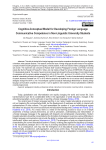
Статья научная
This study is devoted to the foreign language communicative competence development among non-linguistic universities under-graduate students. This research covered the issue of foreign language education based on the cognitive-conceptual model for teaching English to non-linguistic university students. As the main research method, pedagogical modelling was chosen. The experiment was conducted at Russian State Vocational Pedagogical University, Ural Federal University named after the first President of Russia B.N. Yeltsin, and Ural Institute of State Fire Service of EMERCOM of Russia among 72 undergraduate students. The results of several curriculum-based tests showed that the percentage of correct determination of expressions with the context available increased from 54% to 93.2% in EG1, and from 41.9 to 85.5% in EG2. The overall students’ understanding of lexical units increased by 39.2% and 43.6%, respectively. The ratio of misunderstanding/understanding of speech utterances increased from 15/7 to 6/16, while the proportion of students who do not use/use various interpretation strategies changed from 8/14 to 3/19. The developed cognitive-conceptual methodology effectiveness for teaching foreign language communicative competence was proven. It can be applied to train students of various specialisations at different university degree levels.
Бесплатно

